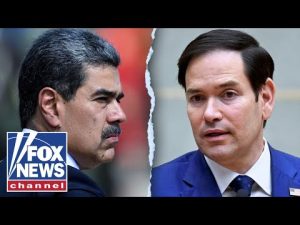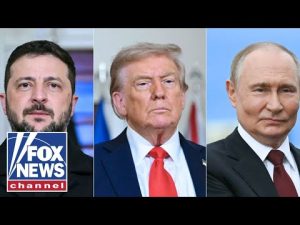The whirlwind of international diplomacy can sometimes feel like the political equivalent of watching a soap opera. This time, the drama unfolds on the grand stage of the Russia-Ukraine conflict with the United States seemingly penning a new chapter, hoping to wrap up the tense saga. As reports emerge of significant progress on a peace plan, one bearing the spectacular branding of a Trump initiative, the world watches closely, popcorn in hand.
In these high-stakes negotiations, it’s been reported that U.S. officials and their Ukrainian counterparts are on the verge of finalizing what must surely be one of the most complex plans in geopolitical history—a 28-point peace proposal that aims to end hostilities with Russia. Not surprisingly, Senator Marco Rubio chimed in, calling the talks “very substantial.” After all, substantial is the only fitting term when one navigates a maze of 28 to 26 points, depending on whose pen was last to scribble changes. Like a meticulous mathematician deducing the Pythagorean theorem without a calculator, Rubio seems hopeful that these discussions will indeed lead to a significant resolution.
Among the hot-button issues bandied about—some tantalizingly juicy and others downright perplexing—are the limits on Ukrainian forces and concessions regarding the embattled Donbas region. The plan reportedly thrills some European leaders with the promise of unfreezing Russian funds and handing over security guarantees to Ukraine, albeit in a more “real” format than past promises—because, in politics, the past is definitely another country, and few lessons seem to stick around for the next campaign. A touch of skepticism is warranted, especially since history remembers well how previous guarantees have held up—or haven’t.
Observers note the glaring absence of Russian representatives in Geneva, casting a shadow over the proceedings as one half of the tango must still remain at the dance hall for this peace negotiation to waltz forward. Nonetheless, the Trump brand, famed for tackling global disputes like they are boardroom quarrels, pushes onward with the same flair you’d expect from a man who has made headlines for everything from peace in the Middle East to curbing nuclear ambitions in distant lands. His track record of diplomacy reads as an adventurous quest, always with the pen ready to strike deals that could tilt the balance of power—or at least the news cycle.
Zooming out from the intricacies of the plan and its drawn-out debates, many experts point to the precarious state Russia currently finds itself in. Reports of dwindling manpower, ongoing military struggles, and even the infamous tactic of using incarcerated individuals to fill the shortfall paint a dire picture. Such images might remind the pessimists among us that desperation leads to rash decisions—something that prudent leaders on the world stage must deftly maneuver to avoid further catastrophe.
In this new chapter, it’s anyone’s guess how the story will resolve. Will these negotiations lead to a lasting peace that draws the curtain on this unfortunate drama? Or will fresh plot twists reset the clock for yet another grueling act? Only time will tell, but if there’s one certainty, it’s that this political saga isn’t finished quite yet.







